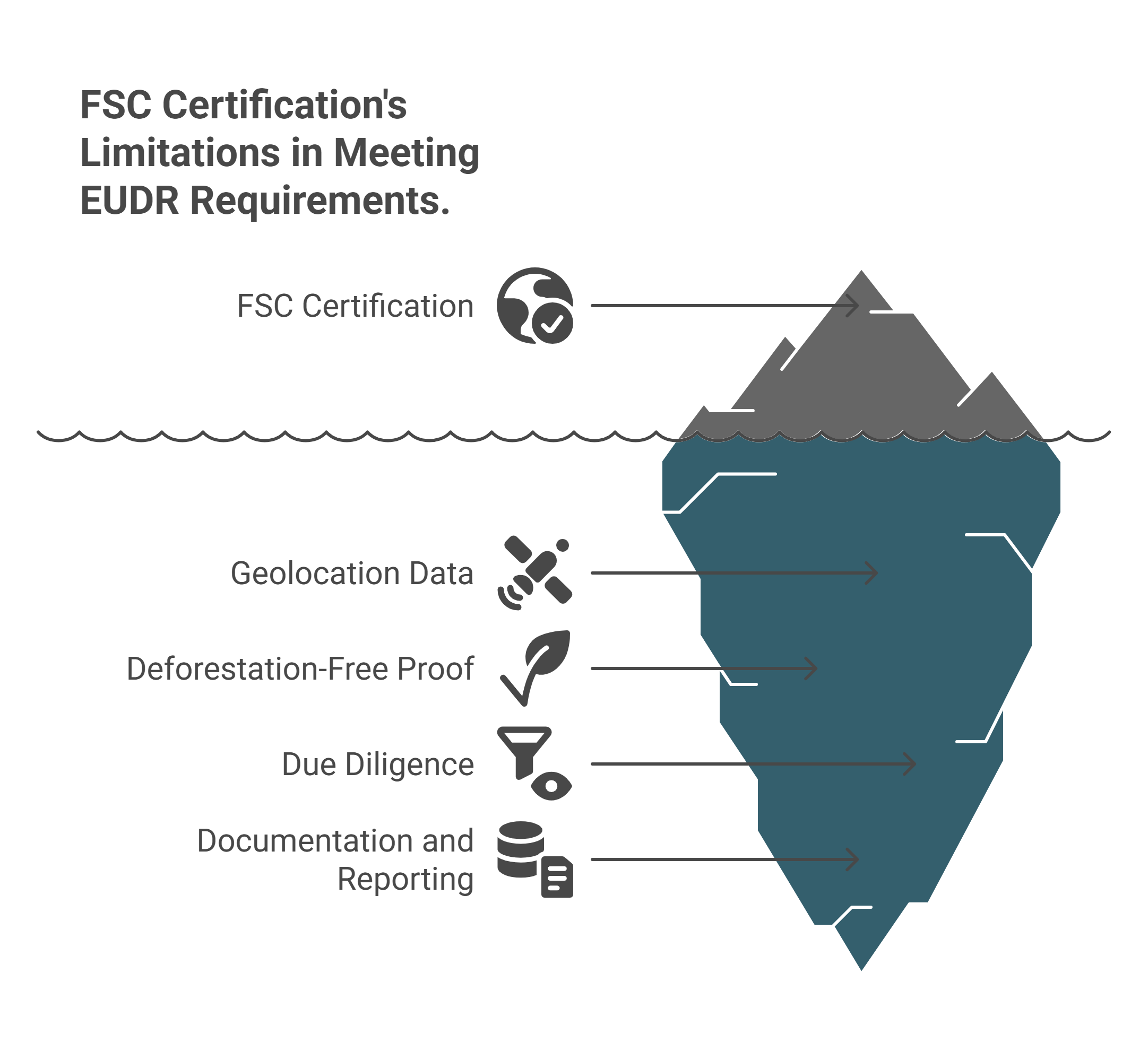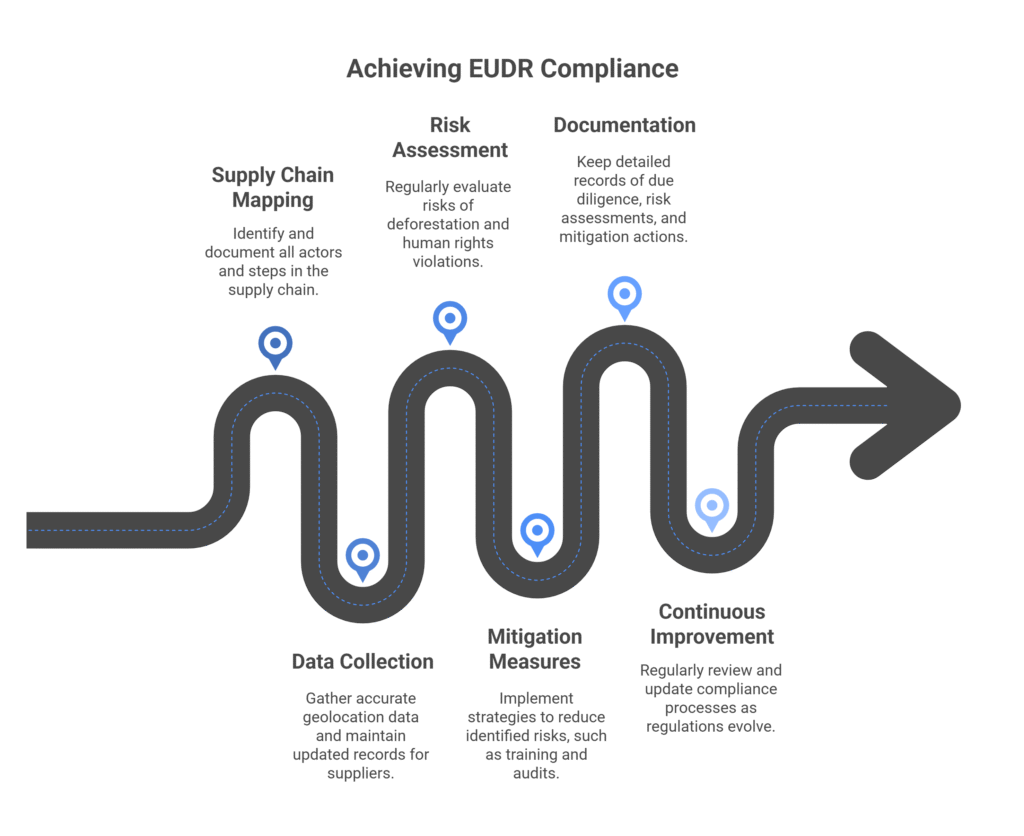Many exporters believe that achieving FSC (Forest Stewardship Council) certification is sufficient to demonstrate responsible sourcing and sustainability. However, the European Union Deforestation Regulation (EUDR) sets a new benchmark—one that requires much more than certification alone. EUDR is not a certification and EUDR compliance is not a one-time checkbox; it’s an ongoing, systematic approach that demands transparency, traceability, and robust risk management throughout the supply chain.

EUDR is Not a Certificate
Read More
The European Union Deforestation Regulation (EUDR) is a legal obligation, not a certificate. It requires detailed due diligence for each consignment, including:
- Precise geo-coordinates of the production plot
- Full traceability from source to port
- A Due Diligence Statement (DDS) submitted to the EU Commission portal
- Risk assessment and mitigation, often validated by ESA-approved or authorized agencies
“Certification schemes like FSC or PEFC are valuable, but they do not fully cover all the requirements of the EU Deforestation Regulation. Certification does not typically provide precise geolocation coordinates required by the EUDR… even FSC-certified wood could still fall short of EU market requirements.”
— TraceX Technologies
Source »
What the Law Says
“Certification … could be used in the risk assessment procedure. They should not, however, substitute the operator’s responsibility as regards due diligence.”
— European Commission – Recital 52 of EUDR
Source »
Even with FSC-RM, the legal liability remains with the exporter/operator, not with the certifying body. This means:
- Your shipment can still be blocked at the EU border if it lacks proper DDS and verified geo-coordinates.
- FSC certification helps, but it does not guarantee EUDR approval.
FSC Itself Acknowledges the Limitation
“It’s important to note that even if your company becomes certified against the FSC Regulatory Module, this does not guarantee compliance with the EUDR. Only the EU’s competent authorities hold the power to determine compliance.”
— SCS Global Services on FSC-RM
Source »
“FSC certification supports your due diligence—but it doesn’t replace it.”
— TraceX Technologies
So, What Must You Still Do?
Even if you’re FSC-RM certified, you must:
- Collect geo-location coordinates (polygon or point) for each land parcel of origin
- Conduct risk assessments and mitigation
- Submit a Due Diligence Statement (DDS) for each consignment through the EU’s EUDR portal
- Preferably use a verified digital traceability platform or an ESA-recognized data handler
Don’t Confuse Certification with Compliance
FSC-RM is a powerful tool to help structure your systems for EUDR, but it’s only one part of the puzzle. Unless your shipments are backed by compliant DDS, verified geolocation, and an auditable traceability trail, you risk delays, fines, or outright rejection at EU customs.
If your Certification Body is promising an “EUDR Certificate,” ask them this:
“Will this help me submit the Due Diligence Statement, with geolocation and risk assessments, to the EU Competent Authority? If not, what exactly are you certifying?”
True EUDR readiness comes from combining FSC-RM with ESA-verified due diligence statement, digital traceability, and platform support.
EUDR compliance isn’t a checkbox. It’s a system.
At Detroit Consultancy, we help organizations go beyond certification — by implementing real-time due diligence systems, traceability solutions, and EUDR readiness frameworks.
We align FSC with operational DDS.
We validate geo-coordinates.
We prepare you for scrutiny — not just checklists.
Contact us if you want clarity — not just certification.
I am thankful to the organisations with this valuable information like Tracex Technologies, SCS Global services, European Commission – Recital 52 of EUDR
Why FSC Certification Alone Falls Short

While FSC certification is globally recognized and ensures that products come from responsibly managed forests, it does not automatically guarantee compliance with EUDR requirements. EUDR introduces additional obligations, such as:
- Geolocation Data: EUDR requires precise geolocation information for every plot of land where commodities are produced.
- Deforestation-Free Proof: Companies must prove that products are not linked to deforestation or forest degradation after December 31, 2020.
- Due Diligence: Businesses must conduct thorough due diligence, assessing and mitigating risks beyond what certification schemes typically cover.
- Documentation and Reporting: EUDR mandates detailed record-keeping and regular reporting to authorities.
Building a System for EUDR Compliance

To meet EUDR requirements, organizations must go beyond certification and develop a compliance system that includes:
- Supply Chain Mapping: Identify and document every actor and step in your supply chain.
- Data Collection: Gather accurate geolocation data and maintain updated records for all suppliers.
- Risk Assessment: Regularly evaluate risks of deforestation and human rights violations.
- Mitigation Measures: Implement strategies to reduce identified risks, such as supplier training and audits.
- Documentation: Keep detailed records of due diligence, risk assessments, and mitigation actions.
- Continuous Improvement: Regularly review and update compliance processes as regulations evolve.
Frequently Asked Questions (FAQs)
Q1: Does FSC certification guarantee EUDR compliance?
A: No. While FSC certification supports responsible sourcing, EUDR has additional requirements such as geolocation data and proof of deforestation-free supply chains.
Q2: What products are covered by EUDR?
A: EUDR applies to commodities like soy, beef, palm oil, wood, cocoa, coffee, and rubber, as well as products derived from these materials.
Q3: What is geolocation data, and why is it important?
A: Geolocation data pinpoints the exact location of land where commodities are produced. This is crucial for verifying that products are not linked to deforestation.
Q4: What steps should companies take to comply with EUDR?
A: Companies should map their supply chains, collect geolocation data, conduct risk assessments, implement mitigation measures, and maintain thorough documentation.
Q5: When does the EUDR come into effect?
A: The main requirements of EUDR will apply from December 30, 2024, for large companies, with a later date for smaller enterprises.
Q6: What are the penalties for non-compliance?
A: Penalties can include fines, confiscation of products, and exclusion from the EU market.
Expert Opinion
Expert View: Mr. Pradipta Mishra, Sustainability & Compliance Specialist
“EUDR compliance is a paradigm shift for the industry. It’s not just about ticking boxes or holding certifications; it’s about building robust, transparent systems that can stand up to scrutiny. Companies must invest in technology, data management, and supplier engagement to ensure that every link in the supply chain is traceable and accountable. The future of sustainable trade will be defined by those who can demonstrate real due diligence, not just paperwork.”
Conclusion
EUDR compliance is a journey, not a destination. While FSC certification is a valuable foundation, organizations must build comprehensive systems to meet the new regulatory demands. By embracing transparency, leveraging technology, and committing to continuous improvement, businesses can ensure compliance and contribute meaningfully to global sustainability efforts.
